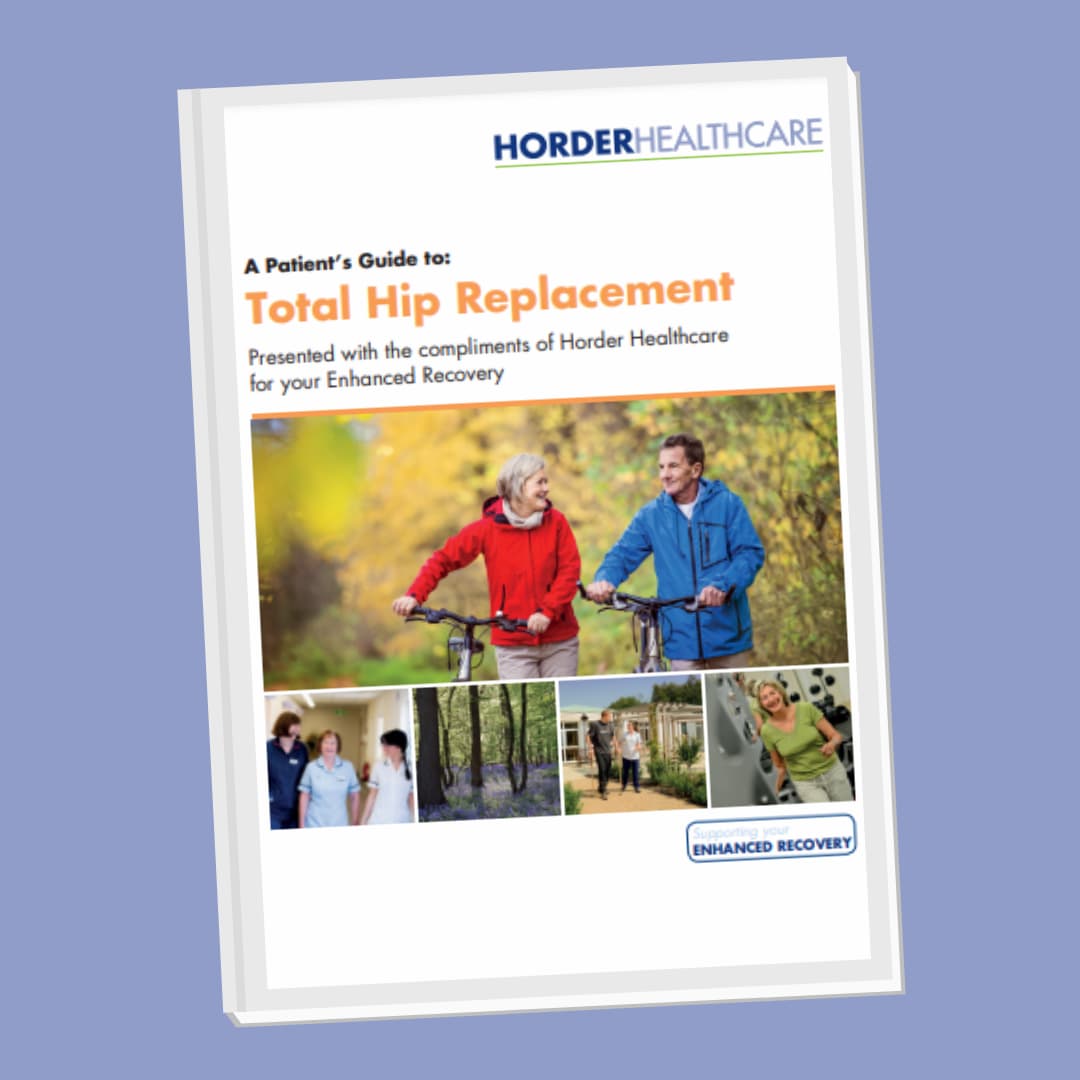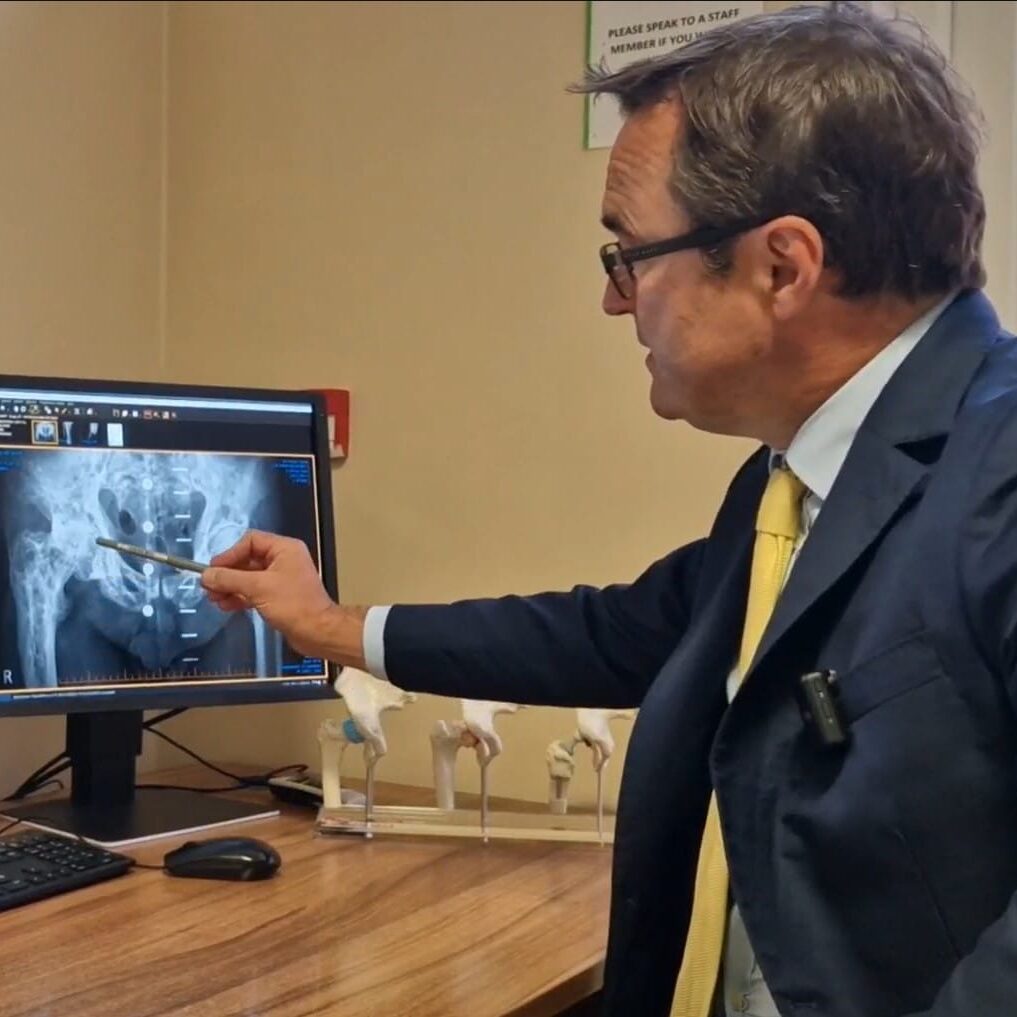What is a hip replacement?
Our hip joint is made up of two parts: the hip socket, or acetabulum, a cup-shaped bone in the pelvis, and the “ball”, which is the head of the thigh bone (femur). Over time, your hip joint can become damaged due to wear and tear as we get older, arthritic conditions or injury. If so, you may be referred for a total hip replacement, a surgical procedure to replace the joint.
During the operation, the two parts of your hip joint are removed and replaced with smooth artificial surfaces. These artificial pieces (the prosthesis) are implanted into healthy portions of the pelvis and thigh bone.
What does the operation involve?
Your surgeon will make an incision on the side of your hip to remove the damaged ball and socket. They will insert an artificial joint made of metal, plastic, ceramic, or a combination of these materials. This is fixed onto the bone using acrylic cement or special coatings that bond directly to the bone.
The hip replacement operation usually takes an hour to 90 minutes. Your anaesthetist will advise you on the various anaesthetic techniques which are available.

Benefits of hip replacement surgery
90% of patients experience a large reduction in hip pain following a total hip replacement, which usually allows them to return to their normal daily activities. You may or may not be able to return to active sports or heavy labour. You should follow the advice of your consultant on the levels of activity you can return to or undertake.
A Patient’s Guide to: Total Hip Replacement

This guide book has been written and designed by the clinical team in partnership with patients to provide you and your family with all the necessary information about having a hip replacement and what to expect before, during and after your operation.
Hip replacement alternatives
There are some alternatives to help manage pain and discomfort associated with arthritis or injury:
Standard painkillers such as paracetamol and anti-inflammatory painkillers such as ibuprofen can help control the pain.
Supplements to your diet may also help relieve your symptoms (you should always check with your doctor before you take supplements).
Using a walking stick can make walking easier, as can a small shoe-raise.
Regular moderate exercise can help to reduce stiffness. Physiotherapy may help to strengthen your muscles.
A steroid injection into your hip joint can sometimes reduce pain and stiffness.
However, many people will find these measures become less effective if your arthritis gets worse and, depending on the severity of your condition, surgery may be the best option.
Enhanced recovery programme
Having an operation can often be both physically and emotionally stressful. Sometimes referred to as rapid or accelerated recovery, enhanced recovery is a new, evidence-based approach that helps people recover from major surgery faster and get you back to full health as quickly as possible.
Our Enhanced Recovery Programme aims to ensure that patients:
• Are as healthy as possible before receiving treatment.
• Receive the best possible care during their operation.
• Receive the best possible care while recovering.
Research has shown the earlier a person gets out of bed and starts walking, eating and drinking after having an operation, the shorter their recovery time will be.
Guide price for self-pay patients
Hip Replacement (Total)
| Estimated Cost * | |
|---|---|
| Initial Consultation | from £220 |
| Diagnostics | from £85 |
| Treatment | from £13,393 |
Estimated total cost from £13,698
Estimated length of stay 2 to 5 days
* The guide price is effective from 1st January 2024
What's included
The treatment price includes surgery, a private en-suite room, inpatient physiotherapy when applicable, and follow-up consultation. The initial consultation fee and diagnostics will be charged separately. Our private patients also receive continuity of care up to and including 120 days following surgery.
The guide price is based on the usual clinical needs of patients. The price you pay might be different depending on your medical history and the type of implant you choose or your Consultant advises is best for you. Not all Consultants are signed up to Horder Healthcare’s treatment price, please check prior to your appointment.
Your price quotation will be made clear to you before you proceed with any tests, consultations, or treatment.
Self-pay

As a private patient, you don't have to wait for our outstanding care.
Health insurance

Our services are recognised by most of medical insurance companies.
Payment plans

Spread the cost of your treatment with Horder Healthcare 0% payment plans
The Horder Centre Price Promise
 Our prices will always be totally transparent and when you are quoted an all-inclusive procedure price for your operation it will be inclusive of all costs – with no hidden surprises.
Our prices will always be totally transparent and when you are quoted an all-inclusive procedure price for your operation it will be inclusive of all costs – with no hidden surprises.
If you find an alternative private hospital in your local area offering a better price for the same procedure, sold with the same service conditions, we’ll lower our price* to equal it.
*terms and conditions apply
* Price Promise terms & conditions:
(1) Initial consultation(s), diagnostic scans/tests and investigations required to establish a diagnosis are not part of your procedure price.
(2) Our price promise does not include Private Patient Units at NHS hospitals.
(3) Local area defined as within 15 miles of The Horder Centre hospital.
(4) We will match against personalised, written quotes only.
(5) Quotations must be less than 90 days old.
(6) Patients must meet the clinical criteria for admission to the Horder Centre.
Hip replacement at The Horder Centre
Consultant Orthopaedic Surgeon Andrew Skyrme talks about choosing The Horder Centre for hip replacement surgery.
Get referred to The Horder Centre today
The Horder Centre provides the highest quality services to NHS, privately insured and self-pay patients, from initial consultation and diagnostic tests right through to surgical treatment and rehabilitation.
We are rated as a 5* healthcare provider
Read our latest patient reviews on the NHS Choices website.














